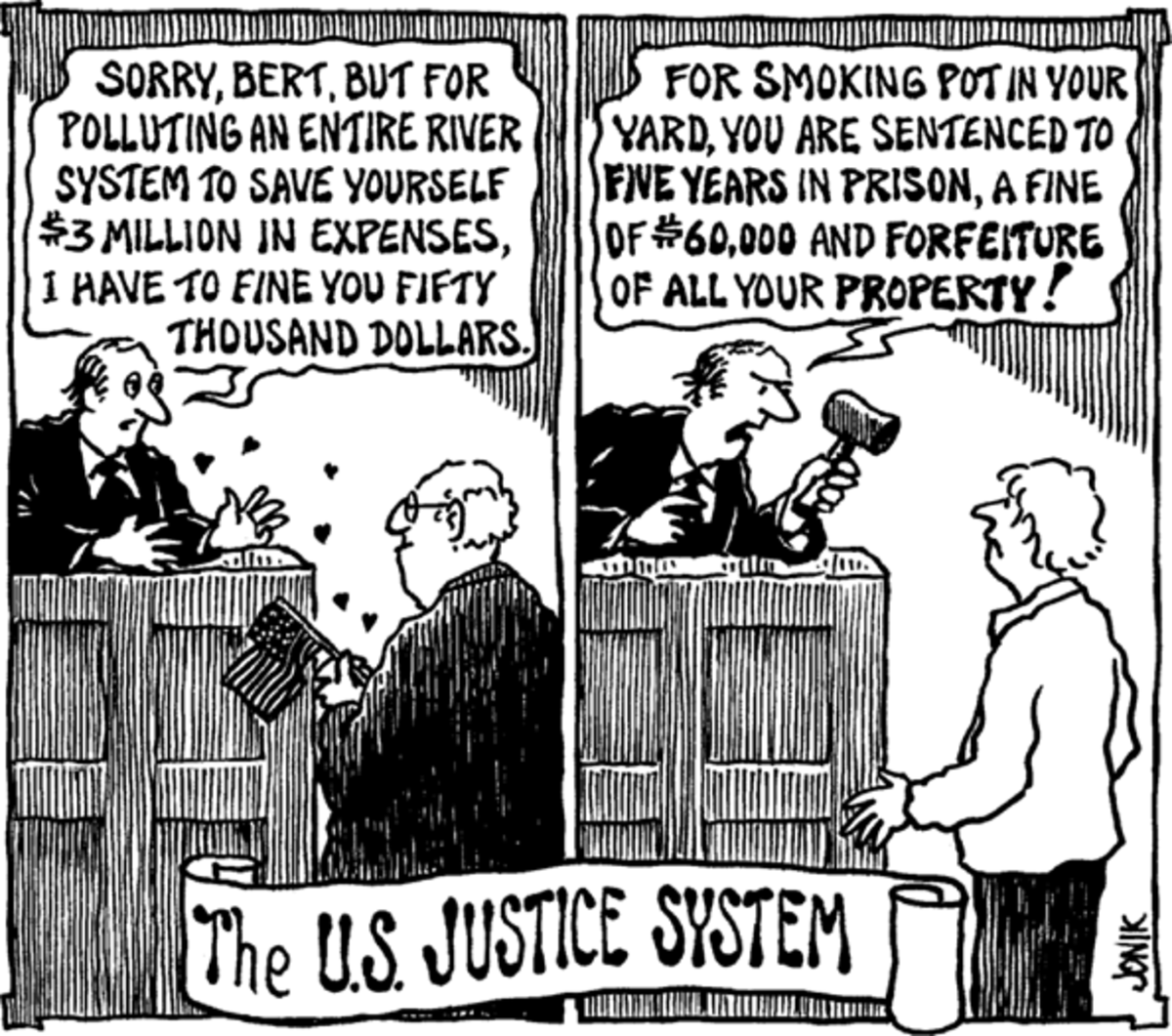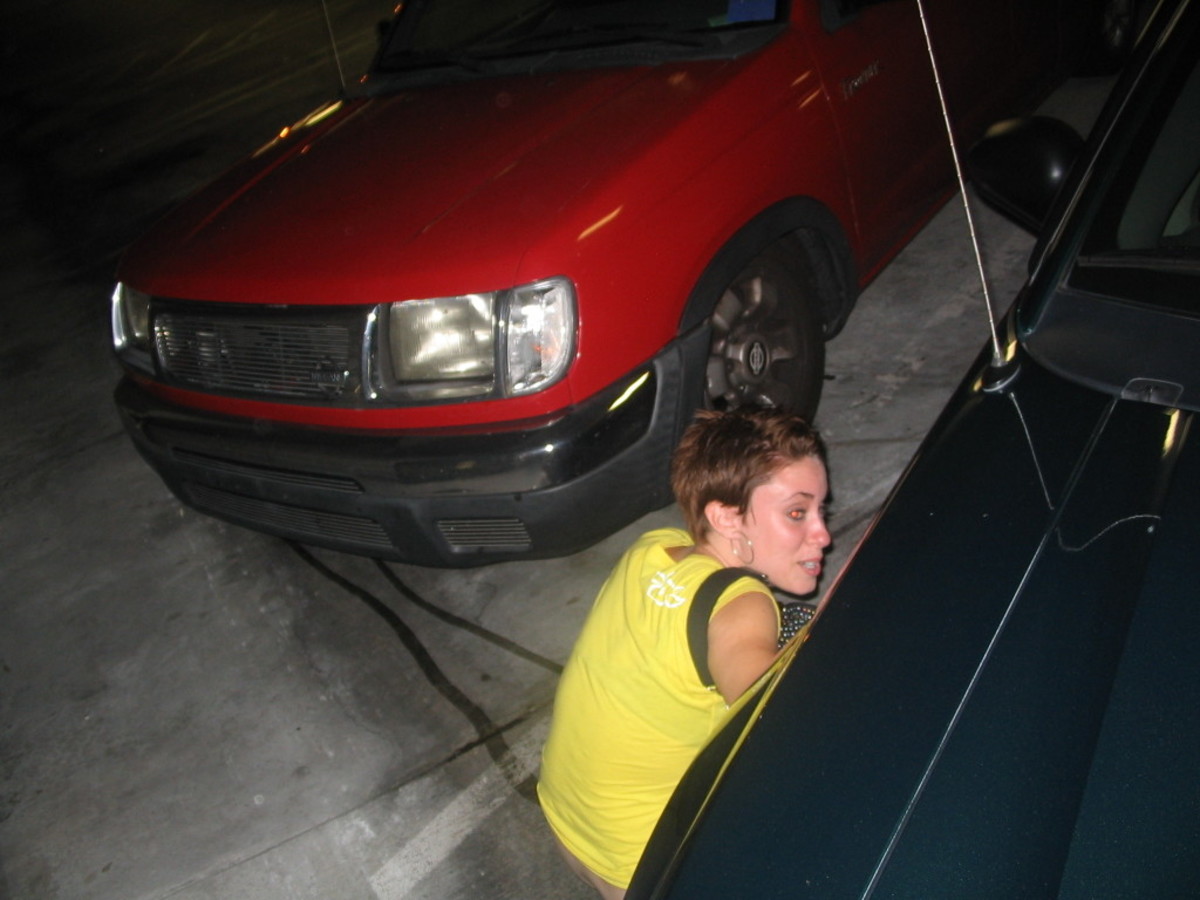Victimless Crimes

Why Everyone in the U.S. Should Care About Victimless Crimes
I grew up believing that I'd been born in a land of opportunity often called the "home of the free, land of the brave" as heard in the U.S. national anthem by Francis Scott Key and shown in this image. In fact, the idea was so ingrained in me that I signed on to serve my country, as my father and brother had done before me. However, I've since come to question just how much freedom we really have.
The United States has the highest incarceration rate of any nation in the world. Nearly one in every hundred adults are in jail or prison. About one of every 32 American adults is incarcerated, on probation, or on parole at any given time, according to the U.S. Department of Justice. Every inmate costs taxpayers between $23,000 and $32,000 per year.
Although states differ in exactly how much it costs to keep someone in jail or prison, the VERA Institute of Justice reports that in 2010, taxpayers footed $39 billion worth of costs to operate the nation's prisons. (These figures don't include secondary costs like assistance programs for families whose primary breadwinner is now absent.)
Our tax system isn't based on equal contributions from taxpayers. If it was, this would mean every American adult who wasn't in prison would have been responsible for paying around $6,000 a year. Instead, taxpayers contribute a portion through state and federal taxes, and corporations pay a portion of the costs, which are ultimately passed on to their end users, of course.
Imagine writing a check each year to pay to keep inmates in prison. Would you willingly sign your name to that check or would you insist on finding ways to lower that cost? What if someone came along and informed you that half of that check was being spent to keep someone in prison for a victimless crime? Would you want to find out what that meant?
Would you be willing to reclassify some laws if it saved you a few thousand dollars a year?
John Stossel's Examination of Victimless Crime
This video is an in-depth look at how thousands of vague laws can place almost any American at risk. It examines the ideas behind legislating morality, and considers the effects of decriminalizing prostitution and drug use in places where these acts are no longer criminal.
"Everything is Illegal!" -Felonies YOU Can Be Charged With?
As a general rule, do you believe morality should be legislated?
Definition of Victimless Crimes
Identifying exactly what constitutes a victimless crime is a difficult task.
First, there are two arms of the law that affect U.S. citizens. One is criminal law. Breaking criminal laws can land a person in jail or prison. Then there's civil law. People who don't abide by civil laws could go to jail, but are most likely going to face financial penalties for their disobedience. For instance, driving a car without a valid driver's license wouldn't result in an arrest the first time, but could eventually put someone in jail if they continued to ignore the law.
There are four primary types of victimless crimes (along with a few examples of each type):
- Crimes in which a person causes harm to themselves (suicide, drug possession, reckless driving, driving while intoxicated)
- Crimes in which more than one person consent to engage in an illegal activity that does not harm others directly (prostitution, sales of illegal drugs)
- Crimes that have a cost to society or an abstract group of people that cannot be identified specifically as individuals (tax evasion, Medicare fraud)
- Crimes against non-persons, like a corporation or government entity (embezzlement, animal cruelty)
These categories can be controversial. Some people would argue that someone who commits an act in any of these categories belongs in prison. Others would claim that none of these acts should be addressed by the prison system. And many would fall between the two extremes and try to isolate which categories or specific acts should be criminal and which should not.
Legal studies would reveal yet more issues. For instance, if a person attempts to commit a crime but fails, it can still be prosecuted. "Attempted theft" is an example where a person can get arrested even though no actual harm resulted.
Here in the U.S., our culture reinforces the idea that we should impose restrictions on things that are unpopular or could cause harm. The vast majority of people would agree that there are too many restrictions in place these days, but almost no two individuals can agree on exactly which restrictions should be lifted.
The table below gives just a handful of examples of things that can result in fines or arrest. Some of these crimes would be punished only in certain states but not others. Most of them are illegal in every state.
Incomplete List of Victimless Crimes
Harm to Self
| Consensual Acts
| Harm to Society
| Harm to Non-Persons
|
|---|---|---|---|
Suicide / Attempted Suicide
| Prostitution/Soliciting
| Public Nudity
| Animal Cruelty
|
Driving Under the Influence (DUI/DWI)
| Other "Bedroom" Acts
| Obscenities Laws
| Embezzlement
|
Drug Possession
| Purchase/Sale of Drugs
| Tax Evasion
| Treason
|
Speeding / Reckless Driving
| Assisted Suicide
| Pyramid/Ponzi Schemes
| Shoplifting
|
Seatbelt Laws
| Unlicensed Prize Fights
| Driving Without Insurance
| Copyright/Trademark Infringement*
|
Helmet Laws
| Poker / Gambling
| Public Intoxication
| Plagiarism*
|
Gun Control Laws
| Statutory Rape
| Automobile Registration/Licensing
| Immigration Offenses
|
Open Container Laws
| Selling One's Body Organs
| Littering
| Necrophilia
|
Jaywalking
| Public Gatherings Without a Permit
| Graffiti*
| |
Not Carrying/Showing ID
| Sexting (Explicit Text Messages)
| Pollution
| |
Refusal to Answer Police Questions
| Homosexuality
| Spitting on a Sidewalk
| |
Dropping Out of School
| Gang Membership
| Misleading Advertising
| |
Possessing Certain Plants, Feathers
| Offering Unlicensed Goods/Services (haircut, food from your garden, puppies)
| Price Gouging
| |
Substandard Property Appearance
| Dodging the Draft
| ||
Having Inoperable Cars in a Driveway
| Loitering
| ||
Holding a Bible Study in a Home
| Begging
| ||
Listening to Music too Loudly
|
*Items denoted here may or may not have actual identifiable victims.
Have you committed any of these acts?
Different Viewpoints
- Drug legalization and ‘victimless crimes’
An argument about why all victimless crimes harm everyone. - The Pernicious Nature of Victimless-Crime Laws | The Freeman | Ideas On Liberty
This article claims that laws creating victimless crimes lead to government corruption. - Every Crime Needs a Victim by Laurence M. Vance
A persuasive argument to decriminalize victimless crimes.
Controversy Surrounds the Concept of Victimless Crime
Some people believe there is no such thing as a victimless crime. The most common arguments to support their claims usually boils down to the idea that an act should be criminalized if it leads toward secondary problems:
- "Adultery harms the family."
- "Drug abuse can lead to other types of crimes."
- "Drug abuse can harm the user's children."
- "Drunk driving can lead to accidents that clearly do have victims."
- "Prostitution can spread STDs. Plus, prostitutes are uneducated and come from bad backgrounds, so they're being victimized by opportunists."
- "Public intoxication can result in others feeling harassed."
Others believe that the secondary problem should be addressed as a crime, or that a crime only becomes criminal when it results in victimization:
- "Drug abuse shouldn't be a crime, but child neglect should be addressed firmly."
- "Drug abuse shouldn't be criminalized, but theft and violence should be harshly penalized."
- "Drunk driving isn't a crime, but fault for an accident should be equal to the amount of damage done."
- "Prostitution can spread STDs, but so can legal, consensual sex. And being uneducated or having a dysfunctional background doesn't mean a person has to make choices that let opportunists take advantage of them."
- "Gambling can hurt a family's financial well-being, but so can a trip to the shopping mall. Monitoring a person's decisions violates the concepts of the U.S. Constitution."
American Asks "Who's in Charge Here?" and Says "Get Involved!"
Be Informed About These Issues. They Affect Your Life

Victimless Crime Statistics and Impact on America
Nearly 30% of all inmates are incarcerated for a crime that falls under the victimless crimes charges described above, according to the Bureau of Justice Statistics'' 2010 report. Other estimates claim as many as 86% of inmates are imprisoned for victimless crimes*. One problem with interpreting the data is that law enforcement will often layer charges in order to increase their odds of getting a conviction. Their evidence might not hold up for one crime, but satisfy the court's conditions for a different one, so they'll charge the accused with both to "see what'll stick."
Remember the information presented in the introduction to this article? If each American adult was equally taxed, the direct tax expense for keeping people in the justice system for victimless crimes amounts to about $2,000 per taxpayer per year.
That's the direct financial impact. These statistics don't account for indirect costs:
- Loss of the prisoners' tax contributions.
- Inmates families who rely on social programs that are funded by taxpayers.
- Bitter, angry people who get released back into society after learning tips and tricks from other inmates, and who now have trouble finding jobs because of their convictions. During their incarceration, they were unable to build skills or receive meaningful education in most instances, and fall behind their peers when competing in the labor force. These individuals often can no longer support their families well and must rely on social programs or return to criminal activity.
- The losses of freedom that are forced upon law-abiding citizens in the name of protecting them from themselves. Some of these freedoms that are lost are basic ones granted in the U.S. Constitution, such as a right to privacy, which may be invaded in order to discover a victimless crime. This is most common with "sting" operations for prostitution or gambling.
- Lost tax revenues that could be raised from activities currently deemed illegal, such as if drug sales and online gambling were legalized.
*Because estimates vary, I recommend using the BJS data. Its methods of categorizing crimes correlates most closely with the idea of victimless crimes vs. crimes with an identifiable victim. As a former corrections officer in a maximum security prison, I had access to inmate identification cards that showed the convictions for which the inmates were serving time. Based on my recollection of reviewing those cards, I would estimate that about 20% of the inmates I guarded were serving time for victimless crimes.
Conclusion
American taxpayers carry a heavy financial burden when it punishes crimes that could feasibly be handled without resorting to the justice system.
What other ways can you think of for addressing these problems? What are your reasons for not wanting to see changes? Do you support some changes but not others? Voice your opinions and let the debate begin!






